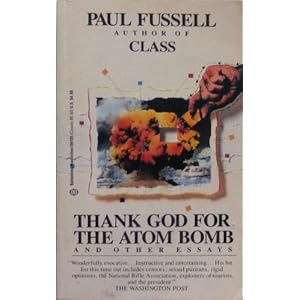I’m seriously contemplating making a regular thing out of the New Republic‘s suspicious silence on Paul Fussell. Granted, events can and do catch editors flatfooted and unprepared. But at this point I fear something worse must be at work.
Fussell died Wednesday. Slate took its time and published a decent essay of Fussell’s literary impact on Friday. There, Fussell admirer Stephen Metcalf wrote that Fussell “was at his best, was most himself, when writing about organized killing,” but judged his influence to be portable to peacetime settings as well. It was a good essay leading up to Memorial Day. I led with it on Real Clear Books this weekend (along with this stinging dissent about Fussell’s book Class). So, eventually, did Arts & Letters Daily.
But from the New Republic, still, crickets.

TNR‘s The Book page reposted this “classic” piece by George Kennan on Americans and Russians rather than repost the very famous essay that became the basis for Fussell’s Thank God for the Atom Bomb and other Essays. The front page called out a review by scholar and failed Canadian politician Michael Ignatieff on a book of hand-wringing about free markets with the headline “The Skyboxification of American Life.” TNR’s aggregator The Reader, which at this point specializes in warmed over Arts & Letters Daily links, can’t even bring itself to reheat the Slate link.
Again, as I have said, this is extra odd, because the New Republic published one of Fussell’s most important essays. Now, in the wake of his death, it is proceeding as if that essay never existed at a time when its republication would get actual traffic. Why wouldn’t it want those hits? A few friends have speculated to me that TNR is staffed with a bunch of younger staffers who don’t remember such things, but that can’t be it. Grand culture editor Leon Wieseltier has weathered several regime changes at the magazine, including a recent handover in ownership. The Fussell essay appeared two years before his appointment in 1983 but he must remember it.
So why ignore it? Embarrassment? It’s possible. In the famous essay, Fussell set himself up as the sworn enemy of moral reasoning that is too abstract, too removed from what, these days, we would call the “boots on the ground.”
Fussell responded to liberal moral hand-wringing about Hiroshima on one of its many anniversaries by saying, OK, let’s see what the troops who would have invaded Japan have to say on the subject. He consulted the writings of the grunts and found in them a plausible argument for why one might say “Thank God for the atom bomb.” They argued Japanese society had been driven collectively so war mad that the distinctions we normally make between soldiers and civilians no longer made sense.
Soldiers in the Pacific theater (Fussell got his “ass shot off” in Europe) viewed the entire island chain as one long meat grinder that would kill at least American soldiers who were already pretty chewed up on the eve an armed invasion that didn’t have to happen because of Hiroshima and Nagasaki. You don’t have to agree with their point of view but it might be worth considering at greater length. You can find that here on this day of memorial, but not on the website of the New Republic.











